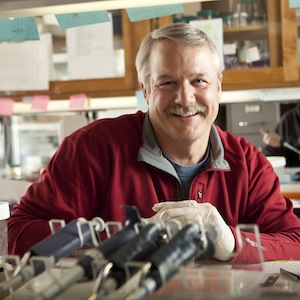Keith Crandall, PhD 
Director
The George Washington University
Computational Biology Institute
Website: cbi.gwu.edu
What inspired you to start research in computational biology?
I've always had a dual interest in math and biology. I found the field of population genetics to be an exciting area to effectively combine these interests. It didn't take long (even as an undergraduate) to realize that I needed some computing skills to get the work done that I wanted to do and effectively address the questions I wanted to ask.
What are 5 important skills needed for your research?
- Writing - you can't do anything without some writing skills. The best research in the world won't get to an audience without effective writing.
- Statistics - you really need at least a reasonable grasp of statistics to really appreciate data complexity and test hypotheses effectively.
- Programming - I'm certainly not the best programmer around, but having some skill at least in scripting simply makes data analysis and manipulation easier and more efficient.
- Communication - as a computational biologist, you have this fun position as the translator between more computer science oriented colleagues and more biology oriented colleagues. It's a really fun spot to be in.
- Mentoring - as you develop your research program, it expands faster than you have an ability to cover by yourself. So developing skills as an effective mentor and collaborator is really important. It's also never too early to start developing such skills. Undergraduates mentor high school students and each other, etc.
How did you learn the computational and quantitative skills necessary for your work?
I started at the undergraduate level where everything looks fun and interesting. I double majored in Mathematics and Biology with a good dose of computer programming. I continued this in graduate school, earning a Master's in Statistics at the same time I earned my PhD in Biology. Undergraduate and graduate curricula are fairly flexible. With the support of good mentors, you can effectively put together a personalized curriculum that allows you to develop the broad skills you need as a computational biologist.
What important questions do you address in your research?
In the past, we've examined model selection approaches in molecular evolution and developed approaches to estimate gene genealogies in a network. We are currently keen on develop and testing approaches for microbiome characterizations and pathogen detection. We are also excited about apply these and other great methods out there to interesting questions in natural history studies and infectious disease studies.
Additional thoughts...
I was recently recruited to George Washington University to start a new Computational Biology Institute. We are currently seeking two new faculty members (tenure-track positions) and are always interested in quality graduate students with interests in computational biology - especially as applied to human health issues.
